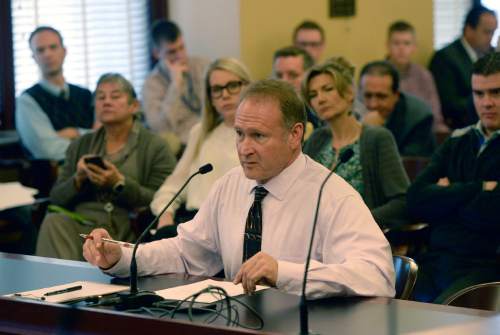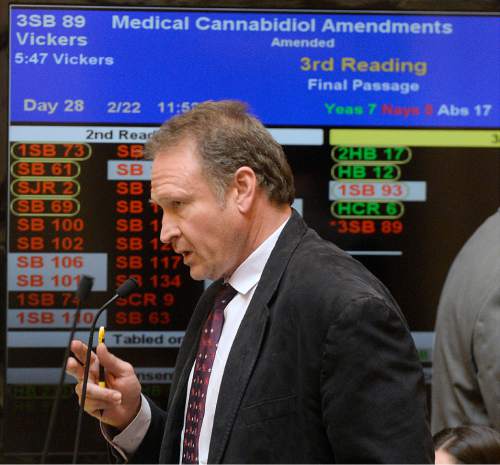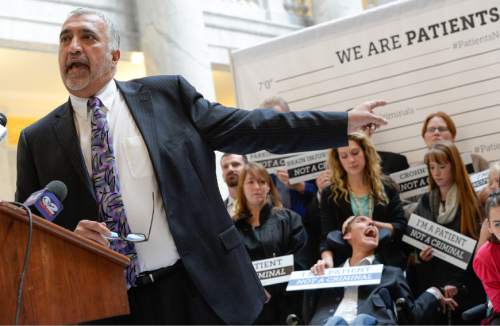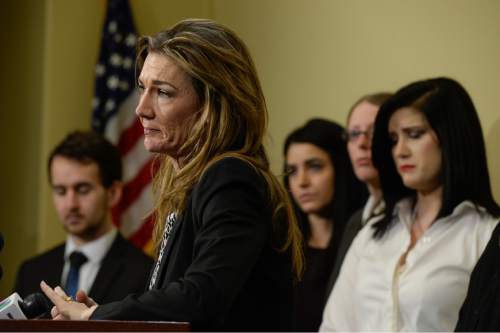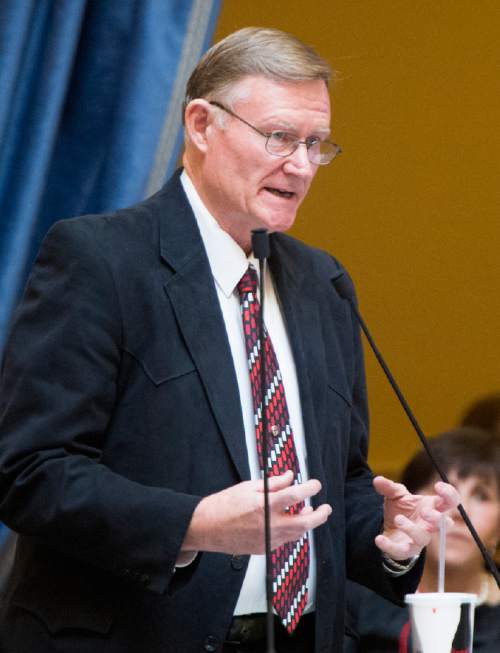This is an archived article that was published on sltrib.com in 2016, and information in the article may be outdated. It is provided only for personal research purposes and may not be reprinted.
A House committee tried Monday to merge two competing medical marijuana proposals into one that would allow trained doctors to recommend marijuana products that contain THC, but would impose more stringent regulations on the drug.
The House Health and Human Services Committee also, for all intents and purposes, killed a more liberal bill, SB73, that had been backed by medical cannabis advocates over concerns that it lacked adequate controls.
Rep. Robert Spendlove, R-Sandy, said that the blending of SB73, sponsored by Sen. Mark Madsen, R-Saratoga Springs, and SB89, sponsored by Sen. Evan Vickers, R-Cedar City, provided a "good, moderated way to bring the policy of [Madsen's bill] and the oversight and protections of [Vickers' bill] together."
Madsen, who has worked for more than a year to make Utah the 24th state to legalize medical marijuana, was upset with the committee's action and said the Vickers regulations are too stringent and won't work.
"It's like trying to put live organs in a cadaver and expect some kind of good outcome. It is fundamentally, functionally constructed to fail," Madsen said. "It's entirely possible they wanted it to fail all along. I don't think it's going to come close to meeting any of the needs for the people. It was a placebo bill from the beginning and was intended to torpedo my bill."
Madsen said he doesn't believe the public — which polls showed support legalization — will tolerate it and efforts will move ahead to put the question on the ballot, likely in 2018.
"Let the political consequences fall where they may. These people just spit in the face of 70 percent of the people of this state and won't even let it go to the floor for a vote," Madsen said. "I'd imagine there may be some political dead men walking that don't even know it."
The committee voted 7-5 to move the blended version of Vickers' bill to the full House for consideration. The Legislature adjourns Thursday.
Originally, the Vickers bill only legalized cannabidiol (or CBD) extracts that had nearly all of the THC — the psychoactive chemical in marijuana — removed.
The new bill would license a team of up to 26 cannabis-trained specialists who could, under a narrow set of guidelines, recommend marijuana products with any amount of THC. Other doctors with specialized cannabis training could approve the use of cannabis products with equal parts THC and CBD.
Rep. Ray Ward, R-Bountiful, said some studies have found that such a concentration is high enough to benefit patients without producing a marijuana high.
"You're pushing me a little further than I want to go," said Vickers, who indicated he had planned to start small and expand the cannabis in the future. "Am I beyond my comfort level? I probably am. But I respect the process."
The compromise bill requires patients suffering from one of several conditions to receive a recommendation from a doctor trained in the use of cannabis. Legally, such doctors are not allowed to prescribe marijuana.
The bill SB89, fifth substitute, requires the state to license two facilities to grow the plants, two to process the products and five dispensaries — with strict supervision of the plants throughout the process. Madsen's bill would have permitted up to 38 dispensaries, however, the merged bill allows products to be shipped to patients.
Like Madsen's bill, the merged legislation would allow children to receive the marijuana products and protects parents who administer the medicine legally.
Lindsay Sledge is one of those parents who has administered medical marijuana to her child. Paloma, who is 3, suffers from uncontrollable seizures that traditional medications have been unable to control and force her to take the child to the emergency room regularly. Sledge said if medical marijuana is not legalized in Utah, the family will likely have to move to another state.
Opponents of legalizing medical marijuana, including the Utah Medical Association, warned that it could open the door to more widespread use by children and result in more impaired drivers on the road.
Jennifer Dailey with the Utah Academy of Family Physicians, said there is "no good science" on medical marijuana and there are no standards for dosing or possible adverse interactions with other drugs. And, she said, it could lead to a perception among youth that it is safe for recreational use.
"There is a normalization with children, where it's this perception that marijuana is safe, even if it's only [legally] used in a medical capacity," she said. "We're worried about raising a generation that sees this as very normalized behavior."
Twitter: @RobertGehrke


